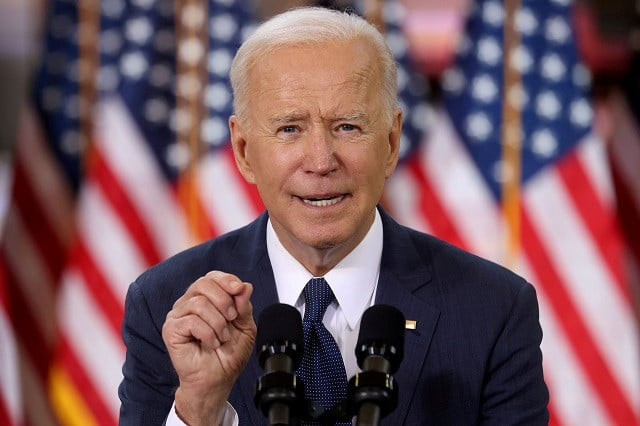US sanctions Russia after Putin sends troops to Lugansk, Donetsk
Biden terms Russian counterpart's actions the beginning of a Russian invasion of Ukraine

US President Joe Biden on Tuesday announced "the first tranche" of sanctions against Russia after Moscow deployed troops in the Lugansk and Donetsk regions.
Russian President Vladimir Putin on Monday signed two decrees, recognising "the Lugansk People's Republic" and "the Donetsk People's Republic" as "independent and sovereign" states, and later ordered troops to enter the regions to conduct peacekeeping operations.
Lugansk and Donetsk declared independence following a vote during the height of armed conflict with Kiev in 2014. Ukraine refused to recognise their self-proclaimed status.
Calling Russia's move "the beginning of a Russian invasion of Ukraine," Biden said in remarks delivered from the White House that his administration will impose sanctions on two Russian financial institutions -- the VEB and the country's military bank -- as well as on Russia's sovereign debt and three individuals.
Also read: West unveils sanctions with more ready if Russia launches full-scale Ukraine invasion
He explained that the measure "means we've cut off Russia's government from Western financing. It can no longer raise money from the West and cannot trade in its new debt on our markets or European markets either."
Biden also mentioned the suspension of the Nord Stream 2 natural gas pipeline project between Russia and Germany, which Berlin announced earlier in the day. Additional sanctions will be followed if the situation escalates, he said.
The president also announced movements of US troops to the three Baltic states of Estonia, Latvia and Lithuania, all of which are members of the North Atlantic Treaty Organisation (Nato) and share borders with Russia.
Biden said that the United States has "no intention of fighting Russia" but will "abide by" its commitments to Nato.
Also read: Russian lawmakers give Putin green light for troops to Ukraine
Following Moscow's recognition of Lugansk and Donetsk, Biden signed an executive order on Monday banning Americans from doing businesses in the two regions.
On Tuesday, US Secretary of State Antony Blinken called off a meeting with Russian Foreign Minister Sergey Lavrov scheduled for Thursday.
During a joint press briefing at the State Department with Ukrainian Foreign Minister Dmytro Kuleba, Blinken said it makes little sense to hold a meeting with Lavrov following the Russian moves.
'Tougher measures'
While imposing the sanctions, the US and its allies made it clear they were keeping tougher measures in reserve in case of a full-scale invasion by Moscow.
European Union sanctions to take effect on Wednesday would add all members of Russia's lower house of parliament who voted to recognise the separatist regions in Ukraine to a blacklist, freezing their assets and banning travel.
Also read: Putin orders Russian troops to Ukrainian breakaway regions
Britain followed the United States in announcing new restrictions banning Russia from the issuing of new bonds in its security markets.
The steps follow measures announced on Tuesday, including freezing the approval of a new Russian gas pipeline by Germany, and imposing new U.S. sanctions on Russian banks.
But none of the measures announced so far directly targets President Vladimir Putin himself, or is expected to have severe medium-term consequences for Moscow, which is sitting on more than $630 billion in international reserves.
Western countries fear Russia plans a full-blown invasion of Ukraine after Putin announced on Monday he was recognising two small breakaway regions controlled since 2014 by separatists viewed by the West as Moscow's proxies. Putin also signed a decree allowing Russian forces to be deployed there.
(With additional input from Reuters)



















COMMENTS
Comments are moderated and generally will be posted if they are on-topic and not abusive.
For more information, please see our Comments FAQ